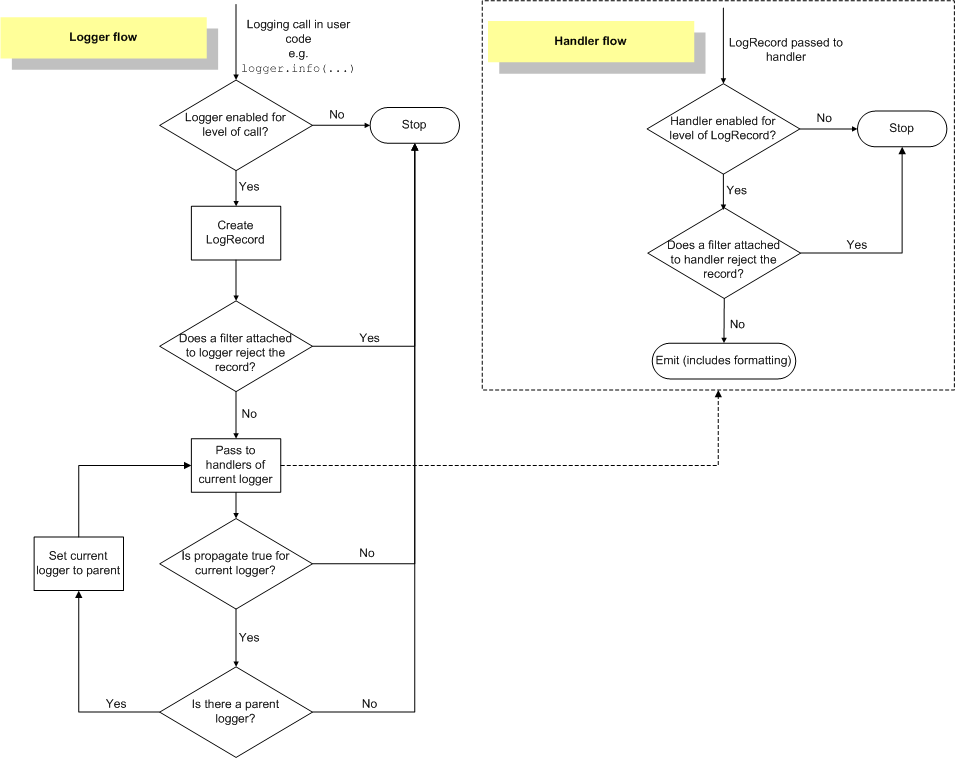Preface
推荐阅读:
PEP282( 提出者就是logging模块的作者)
Good logging practice in Python
官方文档( 以及开头右端的三个Tutorial)
基础性的介绍
Logging是用来track在软件运行过程中事件的发生的。软件工程师可以通过它来声明某些事件的发生。事件可以由描述性信息加上数据变量组成。
我们可以声明事件的重要性,一般称作等级(level)或者严重程度(severity)。

Note: 默认进行处理的level是WARNING,只有高于或等于此等级的日志会被track.
被捕捉到的时间可以用不同的方式去处理。最简单的处理莫过于直接输出到控制台;另一种通常使用的方式是写入到日志文件中。
其他的就不多言了,阅读推荐阅读的几篇文章就好
进阶与技巧
- 我们经常会有这么一个需求,需要在抛出异常时,将异常的具体信息也记录到日志中。我们可以这么做:
try: a = 1/0 except Exception as e: logger.exception('something error')exception实质是对logger.error的封装,设置参数exc_info = True。
所以如果我们有比较奇葩的需求,譬如在 info level 也打印异常信息怎么办:logger.info(msg,exc_info=True).
-
另一个也很常见的需求是,我们需要把日志保存到文件,方便调试和排查错误。一开始是只有FileHandler的,但是在生产环境中,日志文件大小会增长。所以后来有了RotatingFileHandler以及TimedRotatingFileHandler. 前者可以通过设置 maxBytes 来使得文件大小不超过此字节数;后者可以通过设置间隔或特定时间点来更新(生成新的)日志文件。
此外的SMTPHandler也可以非常方便地发送邮件。
根节点(RootNode)
先来看看其定义:
class RootLogger(Logger):
"""
A root logger is not that different to any other logger, except that
it must have a logging level and there is only one instance of it in
the hierarchy.
"""
def __init__(self, level):
"""
Initialize the logger with the name "root".
"""
Logger.__init__(self, "root", level)
非常简单,仅仅是将Logger类初始化方法中的name参数设置为了’root’而已。
再加上这几行代码:
root = RootLogger(WARNING)
Logger.root = root
Logger.manager = Manager(Logger.root)
第一行代码意味着RootLogger的level默认值为WARNING。 Manager是一个掌握loggers层级结构的单例类。其中我们非常熟悉的Moudule-Level的getlogger就是调用的此类的同名方法。
我们再来看看Moudule-Level的info、error等方法的代码:
def error(msg, *args, **kwargs):
"""
Log a message with severity 'ERROR' on the root logger. If the logger has
no handlers, call basicConfig() to add a console handler with a pre-defined
format.
"""
if len(root.handlers) == 0:
basicConfig()
root.error(msg, *args, **kwargs)
basicConfig()是针对根节点logger的系列设置。当参数列表为空时,默认生成一个写入到sys.stderr的StreamHandler以及一个比较美观的Formatter绑到RootLogger.
NOTE: 当我们新生成一个Logger实例时,level默认值是NOTSET(0)。如果不调用setLevel进行设置的话,库内部会调用getEffectiveLevel函数不断查找其父节点level不为0的值,不存在则返回NOTSET。
线程安全:
The logging system should support thread-safe operation without any special action needing to be taken by its users.
Logging是通过threading.RLock,即可重入锁来实现线程安全的。
我们知道,当多个线程同时对共享数据,譬如Manager类里的loggerDict进行修改时,是需要加锁的。那么,用threading.Lock不行么,是什么导致的需要用可重入锁呢?
官方模块里关于此的一段注释:
#_lock is used to serialize access to shared data structures in this module. #This needs to be an RLock because fileConfig() creates and configures #Handlers, and so might arbitrary user threads. Since Handler code updates the</br> #shared dictionary _handlers, it needs to acquire the lock. But if configuring #the lock would already have been acquired - so we need an RLock.</br> #The same argument applies to Loggers and Manager.loggerDict.
可以看到与_handlers和fileConfig()有关系:
_handlers = weakref.WeakValueDictionary() #map of handler names to handlers
_handlerList = [] # added to allow handlers to be removed in reverse of order initialized
def fileConfig(fname, defaults=None, disable_existing_loggers=True):
"""
Read the logging configuration from a ConfigParser-format file.
This can be called several times from an application, allowing an end user
the ability to select from various pre-canned configurations (if the
developer provides a mechanism to present the choices and load the chosen
configuration).
"""
import configparser
if isinstance(fname, configparser.RawConfigParser):
cp = fname
else:
cp = configparser.ConfigParser(defaults)
if hasattr(fname, 'readline'):
cp.read_file(fname)
else:
cp.read(fname)
formatters = _create_formatters(cp)
# critical section
logging._acquireLock()
try:
logging._handlers.clear()
del logging._handlerList[:]
# Handlers add themselves to logging._handlers
handlers = _install_handlers(cp, formatters)
_install_loggers(cp, handlers, disable_existing_loggers)
finally:
logging._releaseLock()
关于线程安全的具体分析等之后有空再来填坑
最后再来一张官方文档的流程图:
